
After nearly two years of pandemic-related border closures and restrictions, COVID-19 vaccines are providing hope for a post-pandemic surge in international travel and tourism. Still, even after the pandemic, some people will have greater freedom and access to world travel than others – depending on the passport they carry.
In a post-COVID-19 world, a number of factors can impact one’s ability to globetrot freely, including international perceptions of the traveler’s nationality, restrictions on obtaining dual citizenship, and the number of countries the traveler can enter without a visa.
Using an index of these and other measures compiled by Nomad Capitalist, a tax and immigration consultancy company, 24/7 Wall St. identified the most valuable passports in the world.
The places one can visit, without a pre-issued visa, is determined largely by diplomatic ties between the country that issued the passport and the rest of the world. A passport issued by the United States, for example, grants its holder visa-free access to 187 countries – the seventh most of any country. Still, partially because of international perceptions of American travelers, in addition to restrictions on dual citizenship, the U.S. does not rank on this list. Here are 29 countries the U.S. government does not want you to visit.
The countries on this list tend to be relatively wealthy places. In all but two nations on this list, annual GDP per capita is more than double the global average of $11,433, according to the most recent data available from the World Bank. Here is a look at the 10 richest countries in the world.
Click here to see the countries with the most valuable passports
Click here to see our detailed methodology

27. Latvia – tied 25th
> Visa-free travel permitted to: 182 countries
> Dual citizenship: Allowed with restrictions
> Annual int’l departures: 2.4 million (1.2 per person)
> GDP per capita: $17,829
> Population: 1,912,789
The citizens of Latvia, a small country in northeastern Europe, have one of the most valuable passports in the world. Since it restored its independence from the Soviet Union in the early 1990s, the country has been generally perceived favorably by citizens of other countries. Latvians today enjoy a high degree of freedom – with a relatively free press and limited government surveillance.
As is the case with citizens of many European countries, Latvians travel abroad regularly. They made a total of 2.2 million international departures from the country annually, equal to 1.2 trips abroad for every resident.
[in-text-ad]

26. Spain – tied 25th
> Visa-free travel permitted to: 190 countries
> Dual citizenship: Allowed with restrictions
> Annual int’l departures: 22.8 million (0.5 per person)
> GDP per capita: $29,600
> Population: 47,076,781
Spanish passport holders are permitted to travel to 190 countries without a visa. Only four countries, and just one other European country, Germany, have visa-free access to more places.
As a member of the European Union, Spain grants its citizens unfettered access to travel, work, study, and live in much of the rest of the continent.

25. Liechtenstein – tied 25th
> Visa-free travel permitted to: 179 countries
> Dual citizenship: Freely allowed
> Annual int’l departures: N/A
> GDP per capita: $181,403
> Population: 38,019
Liechtenstein is a principality with less than 40,000 citizens, located between Switzerland and Austria. Residents benefit from a high degree of personal freedom and privacy and virtually unrestricted access to dual citizenship.
A passport from Liechtenstein allows for visa-free access to 179 countries around the world.
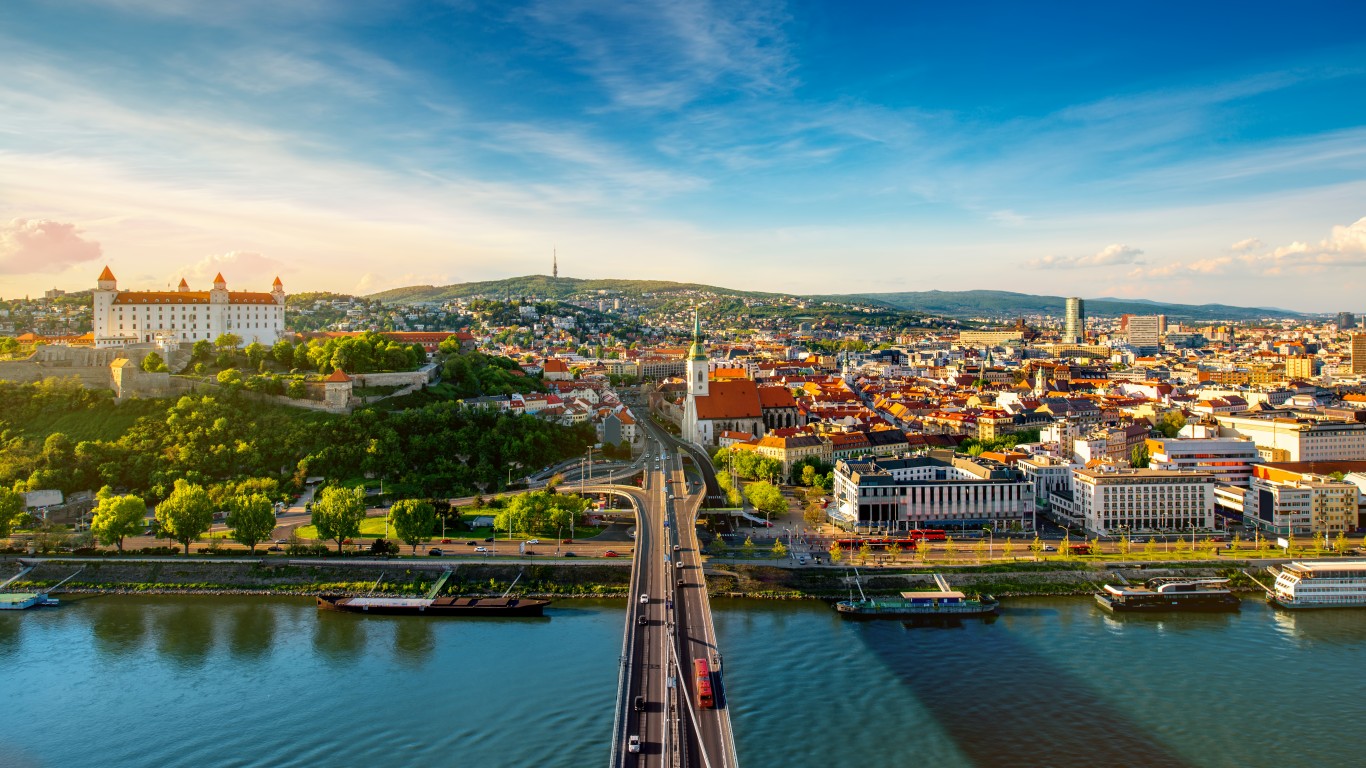
24. Slovakia – tied 23rd
> Visa-free travel permitted to: 183 countries
> Dual citizenship: Usually allowed
> Annual int’l departures: 5.2 million (1.0 per person)
> GDP per capita: $19,266
> Population: 5,454,073
A relatively young country, born in 1993 with the breakup of Czechoslovakia, the central-European country of Slovakia has one of the most powerful passports in the world. Residents of the EU member state have visa-free access to 183 countries around the world.
Foreign nations also tend to have generally favorable views of Slovakians, making them less likely to be subject to scrutiny when traveling abroad. Slovakians make a total of about 5.5 million international departures annually, or about one per person.
[in-text-ad-2]

23. Canada – tied 23rd
> Visa-free travel permitted to: 185 countries
> Dual citizenship: Freely allowed
> Annual int’l departures: 37.8 million (1.0 per person)
> GDP per capita: $46,195
> Population: 37,589,262
Canada is the only country in North America to rank on this list. When travelling abroad, Canadians are generally well-perceived by those of other nationalities. The Canadian government also grants its people dual citizenship far easier than most other countries, including the United States.
Canadian passport holders can travel to 185 countries without a visa, more than any other country in North America except the United States, where passport holders are allowed visa-free entrance to 187 countries.
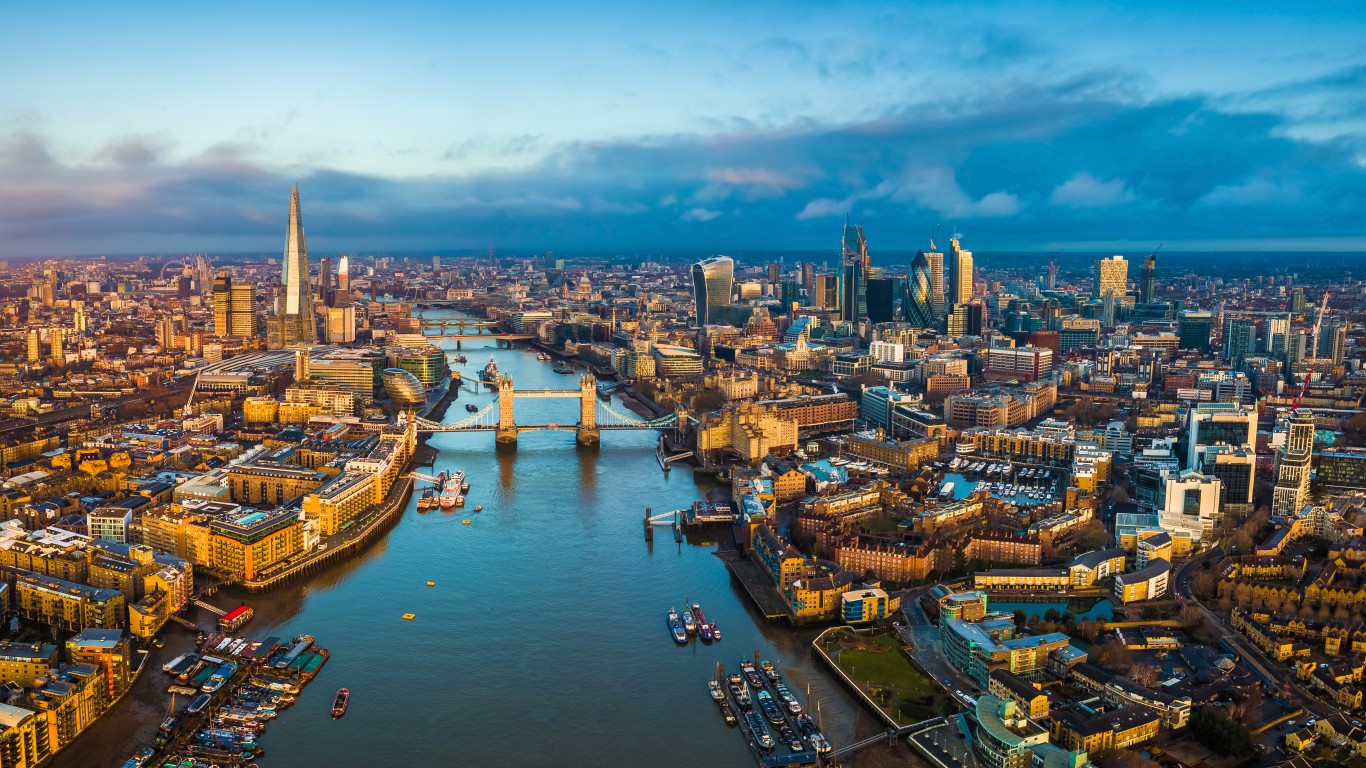
22. United Kingdom – tied 19th
> Visa-free travel permitted to: 187 countries
> Dual citizenship: Usually allowed
> Annual int’l departures: 93.1 million (1.4 per person)
> GDP per capita: $42,330
> Population: 66,834,405
A U.K. passport grants its holders visa-free access to 187 countries around the world. The British are also generally viewed favorably by those of other nationalities.
Like many countries with un-restrictive passports that are well-perceived internationally, the United Kingdom is relatively wealthy. The country’s annual GDP per capita is $42,330, nearly four times the global average of $11,433.
[in-text-ad]
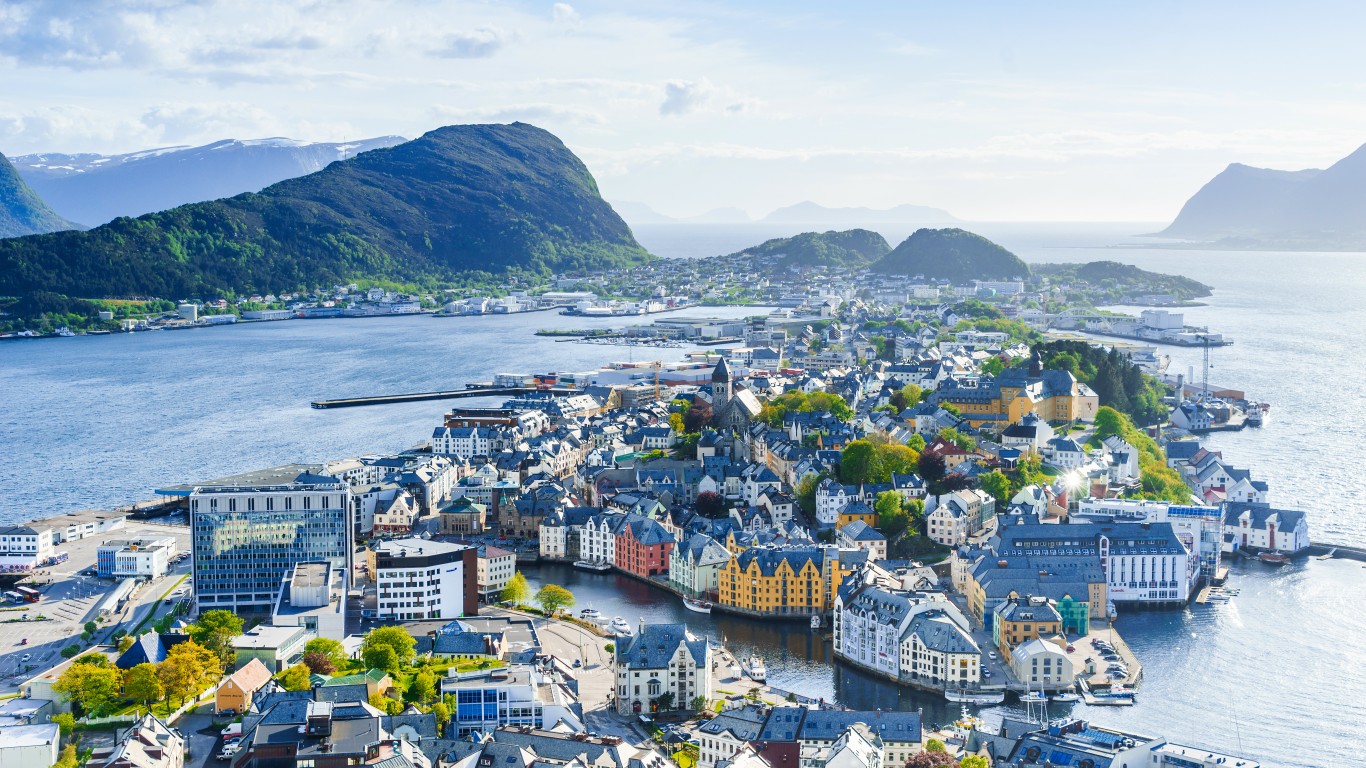
21. Norway – tied 19th
> Visa-free travel permitted to: 186 countries
> Dual citizenship: Freely allowed
> Annual int’l departures: 8.9 million (1.7 per person)
> GDP per capita: $75,420
> Population: 5,347,896
Norway, the northernmost country in Europe, is one of the wealthiest countries in the world. Due in large part to the discovery of oil and gas offshore in the 1960s, the country has a GDP per capita of $75,420.
Like the residents of many wealthy countries, Norwegians have relatively easy access to global travel. Passport holders can visit 186 countries without a visa. Norway also has very little restrictions for those seeking dual citizenship.

20. New Zealand – tied 19th
> Visa-free travel permitted to: 187 countries
> Dual citizenship: Freely allowed
> Annual int’l departures: 3.2 million (0.7 per person)
> GDP per capita: $42,084
> Population: 4,917,000
New Zealanders are relatively free to seek dual citizenship and are generally well-perceived by those of different nationalities. Passport holders are free to travel without a visa to 187 other countries around the world, in line with those who hold passports from the U.S.
Despite its somewhat remote location as an island in the South Pacific, international travel is relatively common among New Zealanders. There are 3.2 million international departures by New Zealand residents annually, or about 0.7 per person.

19. Japan – tied 19th
> Visa-free travel permitted to: 193 countries
> Dual citizenship: Freely allowed
> Annual int’l departures: 20.1 million (0.2 per person)
> GDP per capita: $40,247
> Population: 126,264,931
Japanese passports allow holders to travel to 193 countries without a visa, more than any other passport in the world. For context, American passport holders have visa-free access to 187 countries, and there are over 100 countries with passports that only grant visa-free access to 96 other nations or less.
Japanese citizens also benefit from a high degree of personal freedom and privacy and virtually unrestricted access to dual citizenship.
[in-text-ad-2]

18. Italy – tied 17th
> Visa-free travel permitted to: 190 countries
> Dual citizenship: Allowed with restrictions
> Annual int’l departures: 62.2 million (1.0 per person)
> GDP per capita: $33,228
> Population: 60,297,396
Italian passports allow holders to travel to 190 countries without a visa. Germany is the only European country with a passport that grants visa-free access to more countries than Italy, at 191.
Italians are generally well-received when travelling abroad. Italy is an EU member state, which means Italian citizens can easily travel, work, and live in most of Europe.

17. France – tied 17th
> Visa-free travel permitted to: 188 countries
> Dual citizenship: Freely allowed
> Annual int’l departures: 49.3 million (0.7 per person)
> GDP per capita: $40,494
> Population: 67,059,887
A French passport grants holders visa-free access to 188 countries – one more than American passport holders can visit without needing a visa. French citizens can easily obtain dual citizenship and are generally well-received abroad.
Like many countries with un-restrictive passports that are well-perceived internationally, France is relatively wealthy. The country’s annual GDP per capita is $40,494, nearly four times the global average of $11,433.
[in-text-ad]

16. Iceland – tied 12th
> Visa-free travel permitted to: 182 countries
> Dual citizenship: Freely allowed
> Annual int’l departures: 611,000 (1.7 per person)
> GDP per capita: $66,945
> Population: 361,313
Residents of Iceland enjoy some of the highest levels of freedom in the world – in terms of a free press as well as freedom from mandatory military service and government surveillance. Icelanders can also travel to over 180 countries without a visa and access dual citizenship with almost no restrictions.
Though as an island nation Iceland is somewhat isolated compared to many other countries on this list, international travel is common. Icelanders make about 611,000 international departures annually, or about 1.7 for every resident.

15. Austria – tied 12th
> Visa-free travel permitted to: 189 countries
> Dual citizenship: Freely allowed
> Annual int’l departures: 11.9 million (1.3 per person)
> GDP per capita: $50,138
> Population: 8,877,067
Austria is a landlocked central European country of about 8.9 million people. Dual citizenship is easily available for Austrians. And with a relatively free press and limited government surveillance, residents enjoy a high level of freedom.
Austrian passport holders are free to travel without a visa to 189 other countries around the world – two more than those who hold passports from the U.S.
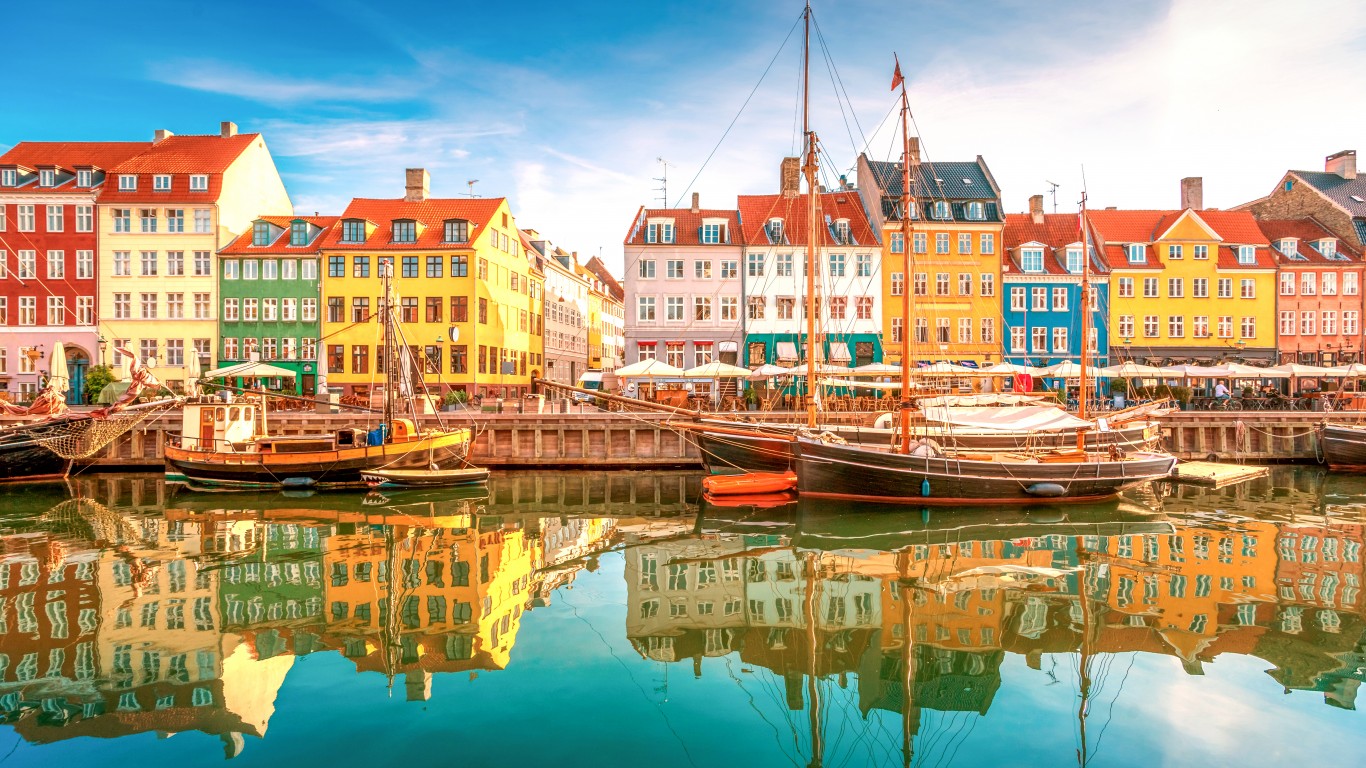
14. Denmark – tied 12th
> Visa-free travel permitted to: 189 countries
> Dual citizenship: Freely allowed
> Annual int’l departures: 10.8 million (1.9 per person)
> GDP per capita: $60,170
> Population: 5,818,553
Danish passport holders have visa-free access to 189 countries – two more than American passports. Such global access is typical for residents of wealthy countries, and Denmark is one of the wealthiest in the world. The country’s annual GDP per capita is $60,170, more than five times the global average of $11,433.
World travellers from Denmark are generally well-perceived abroad and travel outside of their own borders often. There are a total of 10.8 million international departures from Denmark by its citizens annually, equal to nearly two for every Danish citizen.
[in-text-ad-2]
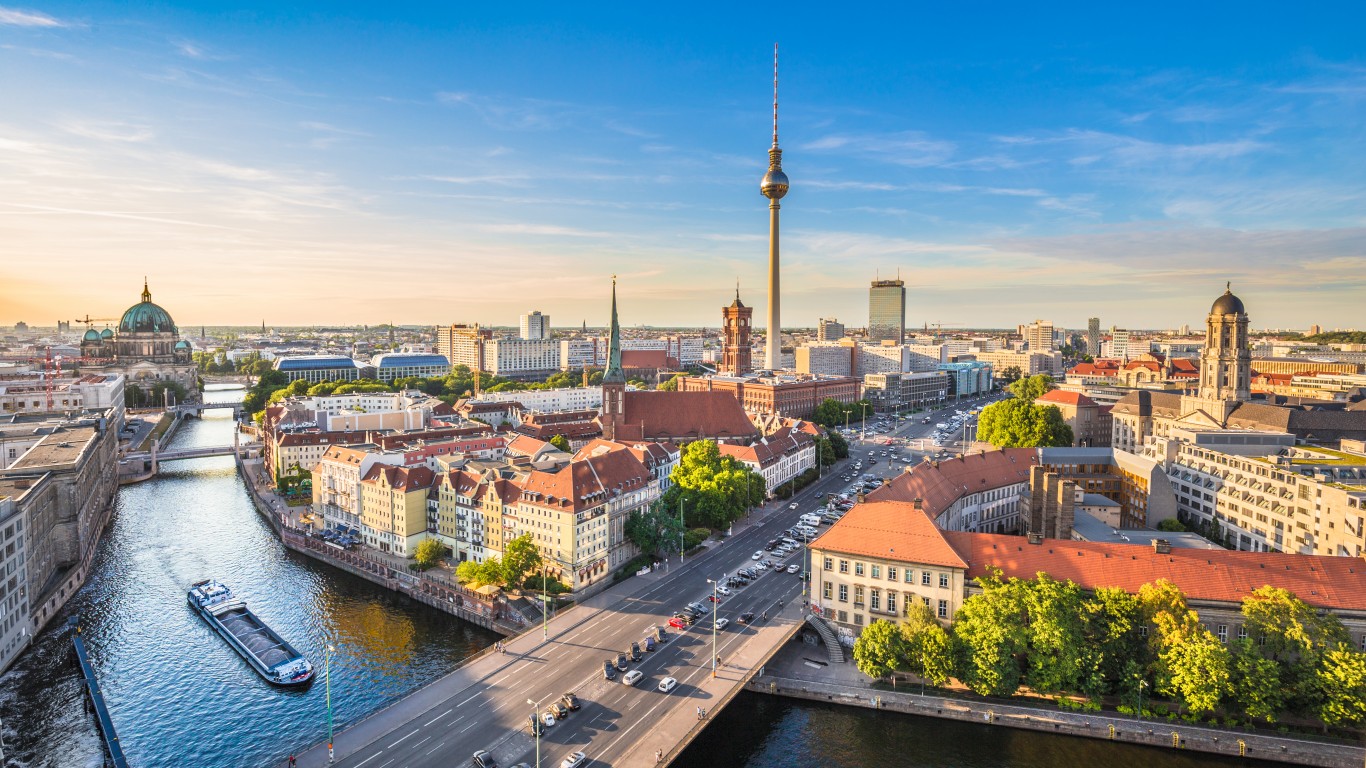
13. Germany – tied 12th
> Visa-free travel permitted to: 191 countries
> Dual citizenship: Freely allowed
> Annual int’l departures: 108.5 million (1.3 per person)
> GDP per capita: $46,445
> Population: 83,132,799
A German passport grants its holders visa-free access to 191 countries worldwide – the most of any European passport and trailing only the passports of Japan and Singapore globally.
German citizens enjoy a high level of freedom relative to much of the world. The industrial powerhouse of Europe, Germany is also a wealthy nation. The country’s annual GDP per capita is $46,445, more than four times the global average of $11,433.

12. South Korea – tied 12th
> Visa-free travel permitted to: 191 countries
> Dual citizenship: Freely allowed
> Annual int’l departures: 28.7 million (0.6 per person)
> GDP per capita: $31,846
> Population: 51,709,098
South Korean passport holders have visa-free access to 191 countries, the most in the world with the exception of passports from Japan and Singapore. One of the wealthiest countries in Asia, South Korea’s GDP per capita stands at $31,846, nearly three times the $11,433 global average. Korean citizens also benefit from relatively unfettered access to dual citizenship.
[in-text-ad]

11. Malta – tied 8th
> Visa-free travel permitted to: 186 countries
> Dual citizenship: Usually allowed
> Annual int’l departures: 774,000 (1.5 per person)
> GDP per capita: $29,821
> Population: 502,653
Malta is a small island nation in the Mediterranean Sea. The nation’s half a million residents live in relative freedom from government surveillance.
Maltese passport holders are permitted to travel to 186 counties without the need of a visa – and international travel is relatively common among the country’s residents. There are a total of 774,000 international departures from Malta annually, or 1.5 for every citizen.

10. Czech Republic – tied 8th
> Visa-free travel permitted to: 186 countries
> Dual citizenship: Usually allowed
> Annual int’l departures: 7.3 million (0.7 per person)
> GDP per capita: $23,495
> Population: 10,669,709
A relatively young country, born in 1993 with the breakup of Czechoslovakia, the central-European country of the Czech Republic has one of the most powerful passports in the world. Residents of the EU member state have visa-free access to 186 countries around the world – three more than Slovakia, the other nation formed after the dissolution of Czechoslovakia.
International travellers from the Czech Republic are generally well-received abroad, and at home, Czech citizens enjoy a high degree of freedom from government surveillance and imposition, like mandatory military service.
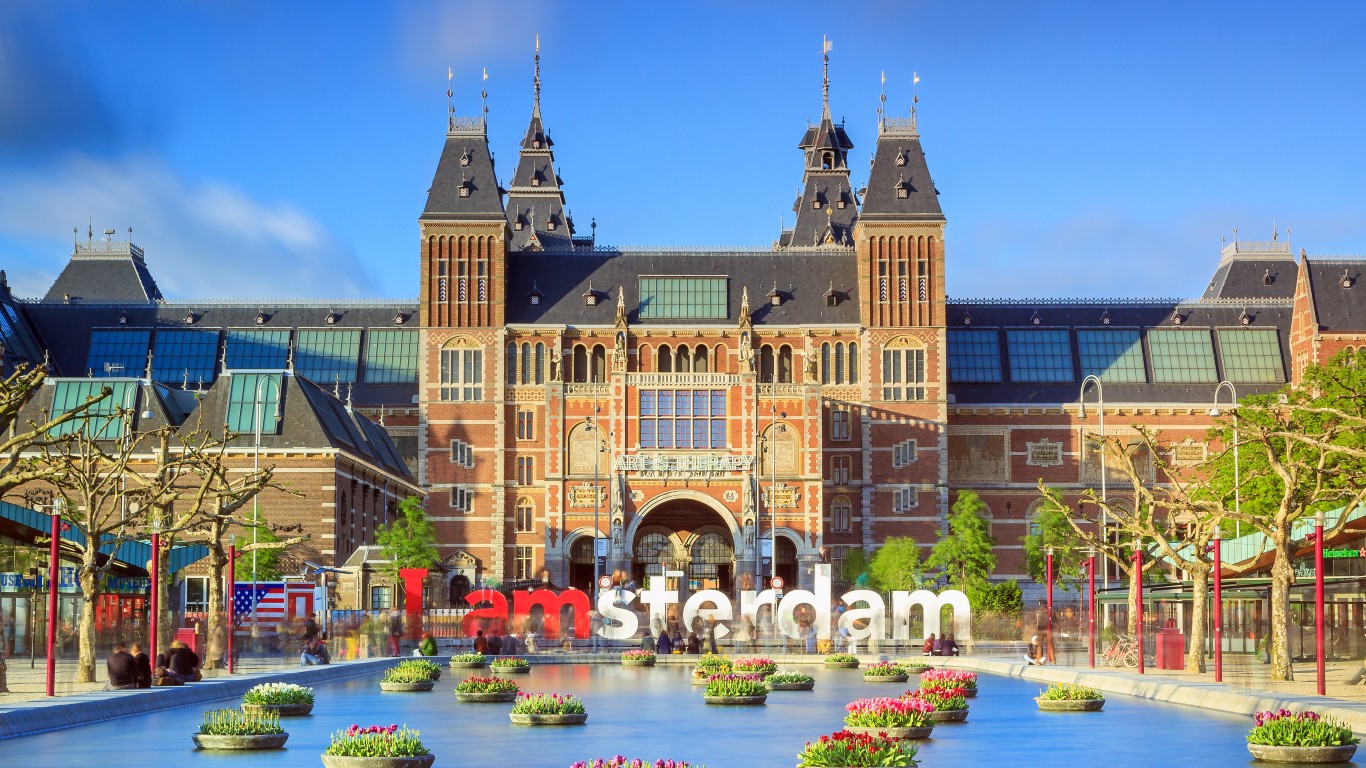
9. Netherlands – tied 8th
> Visa-free travel permitted to: 188 countries
> Dual citizenship: Freely allowed
> Annual int’l departures: 20.9 million (1.2 per person)
> GDP per capita: $52,331
> Population: 17,332,850
Dutch passport holders are free to travel to 188 countries around the world without a visa – one more than American passports allow for. People living in the Netherlands enjoy a high degree of freedom and are largely free to pursue dual citizenship.
One of the wealthiest countries in Europe, Netherlands ‘ GDP per capita stands at $52,331, nearly five times the $11,433 global average.
[in-text-ad-2]

8. Singapore – tied 8th
> Visa-free travel permitted to: 192 countries
> Dual citizenship: Freely allowed
> Annual int’l departures: 10.7 million (1.9 per person)
> GDP per capita: $65,233
> Population: 5,703,569
A passport from Singapore grants its holders visa-free access to 192 countries worldwide – more than any other passport with the exception of Japan, which allows access to one more country. The southeast Asia city state is one of the wealthiest nations in the world, with a GDP per capita of $65,233, in line with that of the United States.
International travel is common for citizens of Singapore. There are a total of 10.7 million international departures from Singapore annually, or nearly two for every citizen.

7. Portugal – tied 6th
> Visa-free travel permitted to: 188 countries
> Dual citizenship: Usually allowed
> Annual int’l departures: 3.1 million (0.3 per person)
> GDP per capita: $23,252
> Population: 10,269,417
Holders of passports issued by Portugal can visit a total of 188 countries without a visa, two less than those with a passport from neighbouring Spain, but one more than those with an American passport.
Still, Portugal ranks higher than Spain on this list partially because it is more lenient with regard to granting residents dual citizenship. Portuguese citizens also enjoy a greater degree of freedom domestically than residents of Spain, according to the report.
[in-text-ad]

6. Finland – tied 6th
> Visa-free travel permitted to: 190 countries
> Dual citizenship: Freely allowed
> Annual int’l departures: 10.4 million (1.9 per person)
> GDP per capita: $48,783
> Population: 5,520,314
Citizens of Finland enjoy a high degree of freedom in their home country, with limited government surveillance, a relatively free press, and no mandatory military service. Those with passports issued by the Finnish government also enjoy a high degree of freedom to travel, with visa-free access to 190 countries, the second most among European countries, trailing only Germany.
International travel is relatively common among Finland residents. There are a total of 10.4 million international departures from the country annually, or nearly two for every citizen.

5. Belgium – tied 4th
> Visa-free travel permitted to: 187 countries
> Dual citizenship: Freely allowed
> Annual int’l departures: 14.2 million (1.2 per person)
> GDP per capita: $46,421
> Population: 11,484,055
According to Nomad Capitalist, Belgian citizens have a high degree of freedom from government surveillance. They are also largely unrestricted from seeking dual citizenship.
Belgians are generally well-regarded by those other nationalities, which makes for better international travel experiences. Those with a Belgian passport can travel to 187 different countries without a visa, equal to the number of countries American passports grant access to.

4. Switzerland – tied 4th
> Visa-free travel permitted to: 187 countries
> Dual citizenship: Freely allowed
> Annual int’l departures: 19.8 million (2.3 per person)
> GDP per capita: $81,994
> Population: 8,574,832
Swiss passports grant their holder visa-free access to 187 countries worldwide, equal to the number of countries American passport holders can access. International travel is relatively common among residents of the landlocked European nation. The Swiss make a total of 19.8 million international departures from their country annually, or 2.3 for every citizen.
One of the wealthiest countries in the world, Switzerland ‘s GDP per capita stands at $81,994, many times greater than the $11,433 global average.
[in-text-ad-2]

3. Ireland – tied 2nd
> Visa-free travel permitted to: 188 countries
> Dual citizenship: Freely allowed
> Annual int’l departures: 9.4 million (1.9 per person)
> GDP per capita: $78,661
> Population: 4,941,444
Citizens of Ireland benefit from a high degree of freedom domestically and face relatively few hurdles to gaining dual citizenship. The Irish are also generally well-received in foreign countries, making for better overall international travel experiences.
Residents of Ireland also have access to more countries than other nationalities. An Irish citizen can travel to 188 countries without needing a visa, one more than U.S. passports allow for.
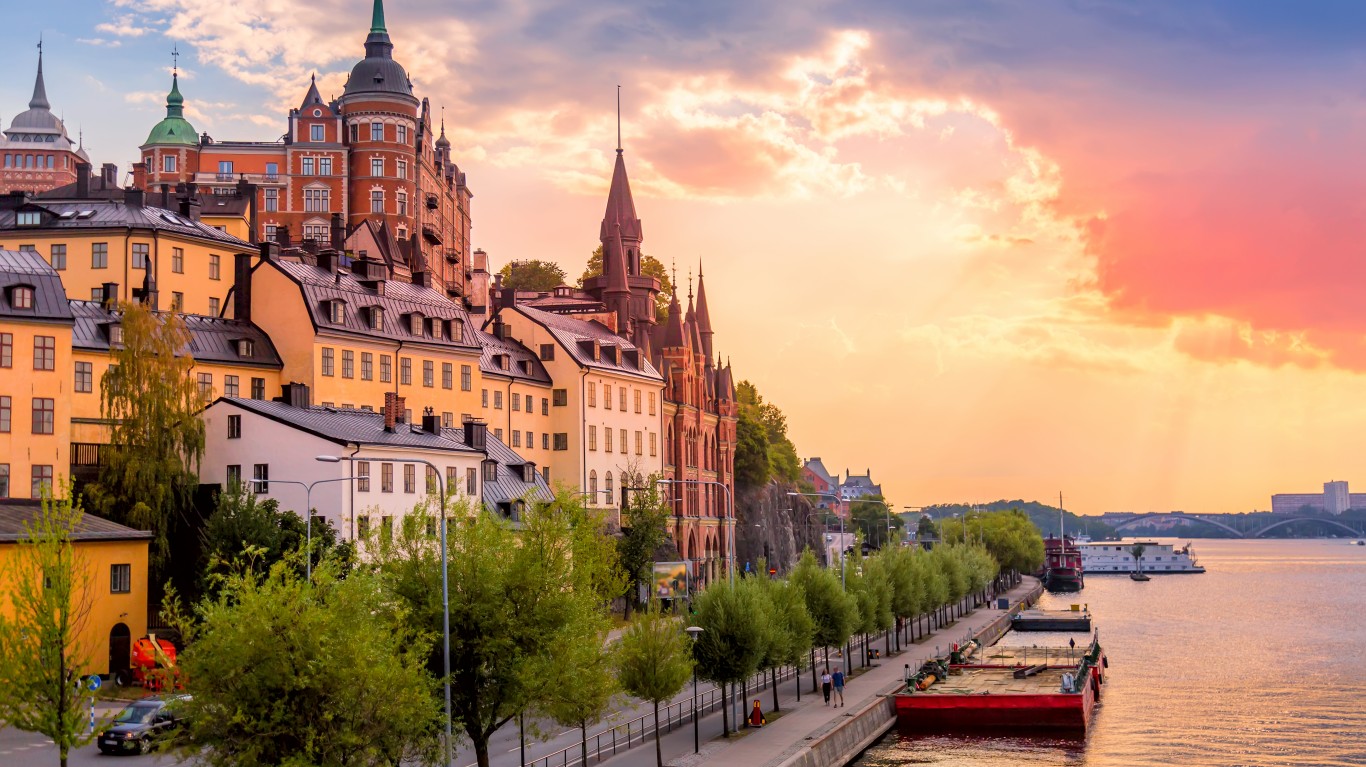
2. Sweden – tied 2nd
> Visa-free travel permitted to: 188 countries
> Dual citizenship: Freely allowed
> Annual int’l departures: 19.1 million (1.9 per person)
> GDP per capita: $51,615
> Population: 10,285,453
Residents of Sweden are among the least restricted in the world, both domestically and in terms of global travel. The country ranks among the most free globally, and residents can obtain dual citizenship relatively easily.
Swedish citizens are generally well-received in foreign countries, and Swedish passport holders can travel to 188 different nations without needing a visa. Swedes leave their home country for destinations abroad a total of 19.1 million times per year, or 1.9 times per resident.
[in-text-ad]

1. Luxembourg – 1st
> Visa-free travel permitted to: 190 countries
> Dual citizenship: Freely allowed
> Annual int’l departures: 2.5 million (4.1 per person)
> GDP per capita: $114,705
> Population: 619,896
Luxembourg is a small landlocked country in western Europe. Those with a Luxembourger passport can travel without a visa to 190 other countries, the second most among European countries, trailing only Germany. And international travel is common for citizens of Luxembourg. Residents leave their home country for destinations abroad a total of 2.5 million times per year, or 4.1 times per resident.
Many countries with un-restrictive passports are wealthy – and with a GDP per capita of $114,705, Luxembourg is one of the wealthiest countries in the world. For context, GDP per capita in the United States stands at $65,298.
Methodology
Based on an index calculated by Nomad Capitalist, a tax and immigration consultancy company, 24/7 Wall St. identified the most valuable passports in the world. The index ranks the power of passports based on five measures: the number of countries accessible without a visa (50%), whether or not a county can tax foreign nationals (20%), ease with which passport holders can obtain dual citizenship (10%), perception of the issuing country by people of other nationalities (10%), and freedom within the issuing country (10%), as measured by mandatory military service, press freedom, and government surveillance. A full methodological explanation is available from Nomad Capitalist’s “Nomad Passport Index 2021.”
The number of countries that passport holders from the nations on this list can visit without a visa came from Henley & Partners, a citizenship planning firm.
We also considered GDP per capita in current U.S. dollars, annual international departures, and population for the most recent available year from the World Bank.
100 Million Americans Are Missing This Crucial Retirement Tool
The thought of burdening your family with a financial disaster is most Americans’ nightmare. However, recent studies show that over 100 million Americans still don’t have proper life insurance in the event they pass away.
Life insurance can bring peace of mind – ensuring your loved ones are safeguarded against unforeseen expenses and debts. With premiums often lower than expected and a variety of plans tailored to different life stages and health conditions, securing a policy is more accessible than ever.
A quick, no-obligation quote can provide valuable insight into what’s available and what might best suit your family’s needs. Life insurance is a simple step you can take today to help secure peace of mind for your loved ones tomorrow.
Click here to learn how to get a quote in just a few minutes.
Thank you for reading! Have some feedback for us?
Contact the 24/7 Wall St. editorial team.
 24/7 Wall St.
24/7 Wall St. 24/7 Wall St.
24/7 Wall St.
